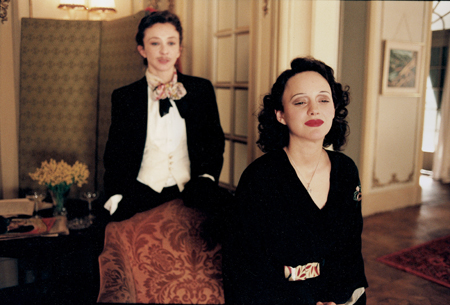|
Reviews of Recent Independent, Foreign, & Documentary Films in Theaters and DVD/Home Video
Written & Directed by: Olivier Dahan. Produced by: Alain Goldman. Director of photography: Tetsuo Nagata. Edited by: Richard Marizy. Music by: Christopher Gunning. Released by Picturehouse. Language: French with English subtitles. Country of Origin: France/UK/Czech Republic. 140 min. Rated PG-13. With: Marion Cotillard, Sylvie Testud, Pascal Greggory, Emmanuelle Seigner, Jean-Paul Rouve, Clotilde Courau, Jean-Pierre Martins, Catherine Allegret, Marc Barbe & Gérard Depardieu. Writer/director Olivier Dahan packs a lot into just the first 30 minutes of his bio/tribute to French singer Edith Piaf: her abandonment by both parents, her upbringing in a brothel, her temporary blindness, the return of her ne’er-do-well circus-performer father, and her elevation to family bread winner as a street singer. Whew! Throughout the film, Dusan intercuts between time periods – whether from her childhood during World War I to the 1950s, when the chanteuse was crippled with arthritis and strung out on morphine, and to her death from cancer in 1963 at age 47. No matter what era, her character remains the same – the waif searching for love, a case study in separation anxiety set to music. Still, there’s a lot left out. World War II and the Nazi occupation of France are mysteriously MIA, leaving out Piaf’s work with the French Resistance. (Then again, maybe Dahan didn’t want to go anywhere near the question of her collaboration as a performer for the Germans.) Also absent is her mentoring of and romance with Yves Montand, and you'd never know that she was married to her second, and much younger, husband at the time of her death. Granted, not everything in an incident-filled life like Piaf’s can be included, unless in a miniseries. But at 140 minutes, the biopic is luxuriously long and commits one sin that would have been an anathema to a cabaret artist like Piaf – the lack of variety. Without question, actress Marion Cotillard’s volatile and feral performance suits Piaf’s temperament, from what can be gleaned from her recordings, but the portrayal rarely strays from the demanding diva. (Everybody, clear the dressing room.) Wide-eyed and all flailing elbows, Cotillard thoroughly transforms herself physically as well as vocally, lip-syncing the musical numbers and capturing Piaf’s strident, nasal resonance in her speaking voice. This career-changing performance may not be what you'd expect based on her earlier roles in A Very Long Engagement, Love Me If You Dare, and her girlfriend role in Big Fish. However, with almost every scene an occasion for a grand gesture, Piaf’s tantrums and erratic behavior eventually become tiresome – there’s not one but two forced separations, each time with Piaf kicking and screaming, and you could play a drinking game to the number of times Piaf collapses. Dahan overemphasizes the coarseness of Piaf and her milieu, even getting a heavily-mannered turn from Sylvie Testud, one of the most subtle but emotionally-invested actors around, as Piaf’s lifelong friend Momone. Dahan never passes on an opportunity for Momone to take another swig from her bottle (in front of a cop and out in public no less) or to cough without covering her mouth. Whereas some directors might tell actors something to the effect of “Don’t act,” Dahan seems to have insisted “More.” More mannerisms, more volume. One exception, though, is Pascal Greggory as Piaf’s put-upon and silently suffering manager. Composer Christopher Gunning must have sensed the audience would need some relief from the aural and emotional fireworks. His melancholic piano-based score gives the audience a much needed breather.
The film hints that Piaf was indirectly or directly involved in the deaths of three men close to her. One, Louis Leplée (Gérard Depardieu in a
supporting role), discovers Piaf singing on the street, instinctually hears star quality, gives her a shot in his cabaret, and just as suddenly is
found dead. The press questions Piaf’s role and that of her shady cohorts in the impresario’s death, and then it’s on to the next step in Piaf’s
career, raising and then dashing curiosity. And in the early ‘50s, the singer’s front seat temper tantrum causes an auto accident, claiming the life
of her young American lover. (The third was middleweight boxing champion Marcel Cerdan, played by Jean-Pierre Martins.) Years before she died, Piaf introduced into her repertoire the defiant anthem,
“Non, Je Ne Regrette Rien (No, I Have No Regrets),” and Cotillard’s powerhouse rendition of it sums up Piaf’s life, but after what we’ve seen,
shouldn’t Dahan have allowed her to feel just a little remorse?
Kent Turner
|

